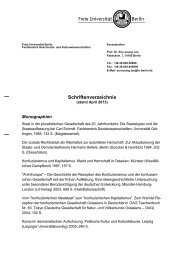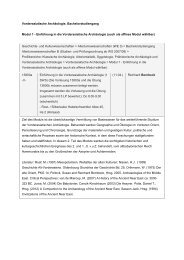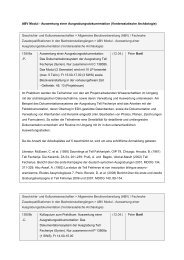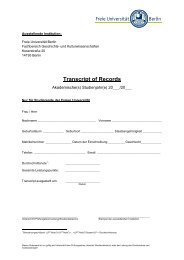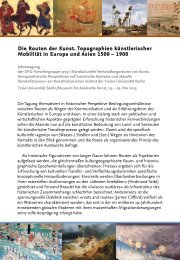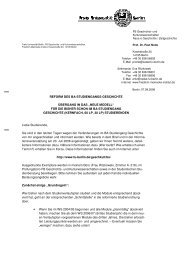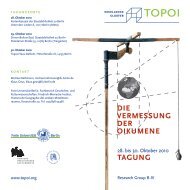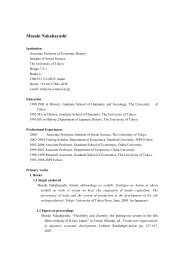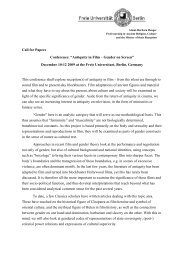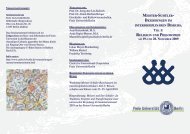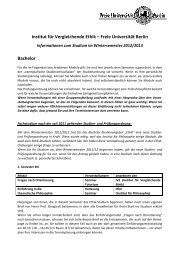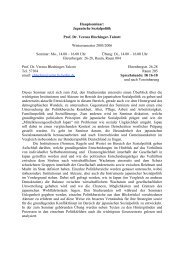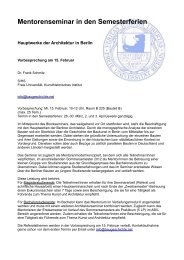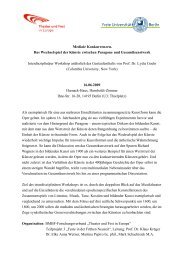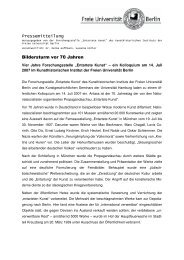- Seite 1 und 2:
Export: Di 14 Sep 2010 13:32:02 CES
- Seite 3 und 4:
Wiesbaden 2005. 13 200 - S - Europ
- Seite 5 und 6:
Die Kaiserviten des C. Suetonius Tr
- Seite 7 und 8:
Jahren der flavischen Herrschaft, d
- Seite 9 und 10:
Jahrhundert, diplomatische Beziehun
- Seite 11 und 12:
einer internationalen Fachtagung (V
- Seite 13 und 14:
 Inhalte der Wissenschaft:
- Seite 15 und 16:
Humanitarian Interventions. Brookly
- Seite 17 und 18:
(32 407) - V - (33 120) - GV - (31
- Seite 19 und 20:
Einführende Literatur: A. R. Hands
- Seite 21 und 22:
Welche Formen des Umgangs mit den b
- Seite 23 und 24:
Geschichte Bd.1: Vom Ende des Alten
- Seite 25 und 26:
Koichi Koshi, Die frühmittelalterl
- Seite 27 und 28:
„französische Zeit“? Unter wel
- Seite 29 und 30:
- V - (2 SWS) Fr 12.00-14.00 - Kose
- Seite 31 und 32:
- Ü - Martell und seine Zeit (2 SW
- Seite 33 und 34:
Weimar-Wien 2003, S. 307-318, 382-3
- Seite 35 und 36:
(2 SWS) (max. 30 Teiln.) Mo 12.00-1
- Seite 37 und 38:
den Master-Beauftragten der Geschic
- Seite 39 und 40:
13 223 - C - 13 225 - C - 13 226 -
- Seite 41 und 42:
13 255 - S - 13 256 - Ü - 13 257 -
- Seite 43 und 44:
(13 018) - C - (13 063) - C - Forsc
- Seite 45 und 46:
(13 218) - S - (13 210) - S - (32 4
- Seite 47 und 48:
(32 402) - GV - (32 403) - HS - (31
- Seite 49 und 50:
(31 607) - C - (2 SWS) (Deutsch/Spa
- Seite 51 und 52:
(13 161) - Ü - (13 012) - S - (13
- Seite 53 und 54:
- V - (13 411) - S - (13 408) - S -
- Seite 55 und 56:
(13 508) - S - Mo 12.00-14.00 - Kos
- Seite 57 und 58:
ersten Hälfte des 19. Jahrhunderts
- Seite 59 und 60:
(13 421) - S - (13 422) - S - Einf
- Seite 61 und 62:
KNOX, R., 1992, Amaravati, Buddhist
- Seite 63 und 64:
(13 433) - S/HS - (13 434) - S/HS -
- Seite 65 und 66:
wie? Zehn Themen und Beispiele, Ber
- Seite 67 und 68:
- V - Neuzeit (2 SWS) Mi 12.00-14.0
- Seite 69 und 70:
ekannt gegeben. Begleitend findet e
- Seite 71 und 72:
Mo 10.00-12.00 - Koserstr. 20, A 12
- Seite 73 und 74:
Entwicklungen - vor dem historische
- Seite 75 und 76:
13 408 - S - Türen und Türprogram
- Seite 77 und 78:
(13 508) - S - (Übungsraum) Postko
- Seite 79 und 80:
Frage nachgegangen, wie sich das Ve
- Seite 81 und 82:
dem Markt mit moderner und zeitgen
- Seite 83 und 84:
Gegenwartskunst. In: Art After Conc
- Seite 85 und 86:
Vertiefungsphase Studienschwerpunkt
- Seite 87 und 88:
Literatur - R. Ball et al. (hrsg),
- Seite 89 und 90:
Wegen möglicher Referatthemen frag
- Seite 91 und 92:
(Übungsraum) In der ersten Hälfte
- Seite 93 und 94:
Vertiefungsmodul Kulturtransfer von
- Seite 95 und 96:
10.12.2010 // 14.01.2011 jeweils vo
- Seite 97 und 98:
13 505 - S/HS - Lansstraße 8 Theor
- Seite 99 und 100:
Do 18.00-21.00 - Koserstr. 20, A 12
- Seite 101 und 102:
(13 056) - HS - Die Klosterinsel Re
- Seite 103 und 104:
Kaufempfehlungen: Tiziano Scarpa: V
- Seite 105 und 106:
13 453 - C - 13 446 - C - 13 447 -
- Seite 107 und 108:
- V - (13 604) - S - 13 610 - S/HS
- Seite 109 und 110:
(13 501) - S - (13 504) - S - (13 5
- Seite 111 und 112:
(13 427) - S/HS - (13 428) - S/HS -
- Seite 113 und 114:
(13 437) - S/HS - (13 438) - S/HS -
- Seite 115 und 116:
(13 453) - C - Colloquium (2 SWS) D
- Seite 117 und 118:
Altertumswissenschaften (WE 3) Stud
- Seite 119 und 120:
Grammatik. Auf der Basis eines Grun
- Seite 121 und 122:
Habelschwerdter Allee 45, KL 25/134
- Seite 123 und 124:
Modul - Epochen 13 902 - Einführun
- Seite 125 und 126:
sowie die Götterbilder in ihrem re
- Seite 127 und 128:
13 911 - Exkursion - Exkursion zur
- Seite 129 und 130:
2002) 163-176. Altorientalistik Ein
- Seite 131 und 132:
egleitenden Übung. Do 10.00-11.00
- Seite 133 und 134:
sondern auch über die sozioökonom
- Seite 135 und 136:
Grundlagen der Ägyptischen Archäo
- Seite 137 und 138:
(13 857) - Ü - - (deutsch) Mi 10.0
- Seite 139 und 140:
13 867 - S - Thüringen in der Frü
- Seite 141 und 142:
der Archäologie. Sie kommen sowohl
- Seite 143 und 144:
Aushang, alternierend mit Grabungsa
- Seite 145 und 146:
Mi 10.00-12.00 - Flachbau Altenstei
- Seite 147 und 148:
Modul 15 - Sachgebiete III - Archä
- Seite 149 und 150:
(deutsch) 21.2.-25.2. - Institut f
- Seite 151 und 152:
und Ökologie im Vorderen Orient, P
- Seite 153 und 154:
im Vorderen Orient (2 SWS) (5 LP) (
- Seite 155 und 156:
13 807a - V - 13 807b - S - Soziale
- Seite 157 und 158:
- HS - Kultbilder (2 SWS) (max. 15
- Seite 159 und 160:
Masterstudiengang Ägyptologie (Stu
- Seite 161 und 162:
Modul - Philologie und Textkultur d
- Seite 163 und 164:
Flachbau Altensteinstr. 15, 1 (Semi
- Seite 165 und 166:
Altensteinstr. 15, 1 (Seminarraum)
- Seite 167 und 168:
in den Texten, die Heranziehung der
- Seite 169 und 170:
(Appadurai, Hrsg. 1986) entdeckten
- Seite 171 und 172:
(Hrsg.), Civilizations of the Ancie
- Seite 173 und 174:
- C - Ägyptologie Altorientalistik
- Seite 175 und 176:
Hauptstudium Klassische Archäologi
- Seite 177 und 178:
Schwerpunkt Turkologie Einführungs
- Seite 179 und 180:
- Ü - (2 SWS) Fr 12.00-14.00 - Ros
- Seite 181 und 182:
(54 351) - Ü - (54 352) - Ü - (Ü
- Seite 183 und 184:
Fr 10.00-12.00 - Rost- / Silberlaub
- Seite 185 und 186:
(2 SWS) (5 LP) (max. 30 Teiln.) Gru
- Seite 187 und 188:
und Entwicklungspolitik; Bd. 1). Ko
- Seite 189 und 190:
Mo 14.00-16.00 - Ehrenbergstr. 26-2
- Seite 191 und 192:
Habelschwerdter Allee 45, KL 23/216
- Seite 193 und 194:
Conrad, Sebastian: Krisen der Moder
- Seite 195 und 196:
in Texten zur Umweltpolitik Japans
- Seite 197 und 198:
gemeinsame Diskussion des Arbeitsvo
- Seite 199 und 200:
Mo 12.00-14.00 - Rost- / Silberlaub
- Seite 201 und 202:
und ökonomischen Voraussetzungen f
- Seite 203 und 204:
14 138 - S - Great Debate on Democr
- Seite 205 und 206:
Formate wie z.B. historische Dokuso
- Seite 207 und 208:
- Ü - (14 147) - S - (14 148) - Ü
- Seite 209 und 210:
und 3B bilden die Grundlage für Te
- Seite 211 und 212:
(14 133) - S - (14 134) - V - (14 1
- Seite 213 und 214:
(14 142) - S - (14 143) - Ü - (14
- Seite 215 und 216:
(2 SWS) (5 LP) Do 16.00-18.00 - Ros
- Seite 217 und 218:
Modul - Theorien und Diskurse der K
- Seite 219 und 220:
(14 139) - Ü - (14 140) - S - (14
- Seite 221 und 222:
Chinese Reader“ / “Das Neue Pra
- Seite 223 und 224:
Arbeitsbuch, entsprechend dem aktue
- Seite 225 und 226:
- Ü/LK - Deutsch Politik und Gesel
- Seite 227 und 228:
Bedingungen auf und erläutert grun
- Seite 229 und 230:
Mi 16.00-18.00 - Ehrenbergstr. 26-2
- Seite 231 und 232:
China im Kontext der modernen Gesch
- Seite 233 und 234: (14 260) - EK - (14 262) - EK - (14
- Seite 235 und 236: - Ü/S/LK - (14 266) - Ü/S/LK - 14
- Seite 237 und 238: - Ü/LK - (14 257) - S - (14 270A)
- Seite 239 und 240: den Teilnehmern werden neben aktive
- Seite 241 und 242: Shanghai baobei dürften zu den Tex
- Seite 243 und 244: Dieser Lektürekurs begleitet das S
- Seite 245 und 246: - EK/GK - (14 255) - EK - (14 256)
- Seite 247 und 248: (14 279) - Ü/S/LK - 14 290 - C - L
- Seite 249 und 250: - Ü - Grammatik / Übersetzung (2
- Seite 251 und 252: (14 302) - S - (14 352) - S - (14 3
- Seite 253 und 254: (14 458) - S - (14 507) - S - Verti
- Seite 255 und 256: Schwerpunktbereich: Iranistik Modul
- Seite 257 und 258: (14 503) - S - Aufbauphase Geschich
- Seite 259 und 260: (8 SWS) (13 LP) Mo, Di, Mi, Do 8.00
- Seite 261 und 262: Di 14.00-16.00 - Schwendenerstr. 17
- Seite 263 und 264: (14 568) - SK - (14 567) - SK - (14
- Seite 265 und 266: Im Zentrum des Seminars stehen ausg
- Seite 267 und 268: (54 010) - Ü - Arabisch IV, 1. Tei
- Seite 269 und 270: - S - (Schwerpunkt Islamwissenschaf
- Seite 271 und 272: Grundlagenphase Modul - Geschichte
- Seite 273 und 274: Modul - Einführung in die semitisc
- Seite 275 und 276: 14 357 - S - 14 358 - Ü - Die Unna
- Seite 277 und 278: Modul - Grundmodul ‘Mitteliranisc
- Seite 279 und 280: Modul - Aufbaumodul ‘Nordkurdisch
- Seite 281 und 282: 14 311 - Ü - Übung zu “Das isla
- Seite 283: Modul - Türkische Lektüre I 14 31
- Seite 287 und 288: Basisstudium Modul - Türkische Spr
- Seite 289 und 290: (14 312) - S - (14 313) - Ü - (14
- Seite 291 und 292: Prüfungsthemen wird gebeten: jpink
- Seite 293 und 294: 14 361 - Ü - Mu‘tazilitische Tex
- Seite 295 und 296: 14 404 - Ü - Amharische Lektüre f
- Seite 297 und 298: südsemitischen Schrift, ZDMG 30 (1
- Seite 299 und 300: (14 457) - Ü - (14 459) - S - (14
- Seite 301 und 302: Begründer türkisch sein konnten,
- Seite 303 und 304: Judaistik (WE 5) Einführungsverans
- Seite 305 und 306: (14 559) - S - (14 560) - S - Toler
- Seite 307 und 308: Mo 10.00-12.00 - Rost- / Silberlaub
- Seite 309 und 310: Aufbauphase I. Fachmodule Modul - D
- Seite 311 und 312: aktiv. Sie waren auch politisch eng
- Seite 313 und 314: - V - (2 SWS) Di 14.00-16.00 - --->
- Seite 315 und 316: Modul III - Geschichte des Judentum
- Seite 317 und 318: Vertiefung im Profilbereich Mittela
- Seite 319 und 320: (14 575) Deutsche Geschichte im Spi
- Seite 321 und 322: Aufbaumodul Holocaust Studies Verti
- Seite 323 und 324: Katholische Theologie (WE 6) Einfü
- Seite 325 und 326: Modul 1b - Klassische Texte, Statio
- Seite 327 und 328: Theologie (Schwendenerstraße 31).
- Seite 329 und 330: Wahrnehmung von Juden und Christen
- Seite 331 und 332: Monotheismus Israels. Entstehung -
- Seite 333 und 334: Nobert Reck: nach Vereinbarung 14 7
- Seite 335 und 336:
Modul - Weltbilder - Menschenbilder
- Seite 337 und 338:
ihre Positionen innerhalb der Famil
- Seite 339 und 340:
29.10.2010, 10 - 16 h in Rost-/Silb
- Seite 341 und 342:
Moralforschung - Zusammenhänge zwi
- Seite 343 und 344:
Zur Einführung empfohlen: Hans W.
- Seite 345 und 346:
Orthodoxy, 1857-1890: Orthodoxy and
- Seite 347 und 348:
darin mitschwingenden religiösen D
- Seite 349 und 350:
(Hörsaal) Auch wenn sich seit der
- Seite 351 und 352:
(14 821) - E/Ü - (13 950) - V/S -
- Seite 353 und 354:
(14 808) - E/HS - (14 811) - S/C -
- Seite 355 und 356:
(14 807) - S/OS - (14 808) - E/HS -
- Seite 357 und 358:
Gosslerstr. 2-4, 009 (Hörsaal) All
- Seite 359 und 360:
Die genaue Teilnehmeranzahlbeschrä
- Seite 361 und 362:
(2 SWS) (5 LP) (deutsch) Di 16.00-1
- Seite 363 und 364:
in der vorlesungsfreien Zeit In dem
- Seite 365 und 366:
Erwerben von Kompetenz in der Kanji
- Seite 367 und 368:
Das Connect Program ermöglicht es
- Seite 369 und 370:
Ausstellung („Wege der Sphinx. Ei
- Seite 371 und 372:
Index Abdelnasser, Gamal 295, 300 A
- Seite 373 und 374:
Köhler, Ines 125, 164, 166 Kolbe,
- Seite 375:
Tetens, Holm 347, 352 Tetik, Ayse 2



